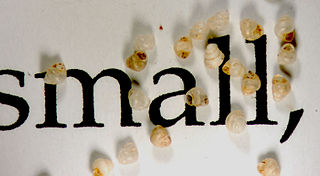
The smallest organisms found on Earth can be determined according to various aspects of organism size, including volume, mass, height, length, or genome size.
Campolaemus is a genus of very small, air-breathing land snails, terrestrial pulmonate gastropod mollusks in the family Streptaxidae.

Diplommatinidae is a family of small land snails with an operculum, terrestrial gastropod mollusks in the superfamily Cyclophoroidea. The Cochlostomatinae Kobelt, 1902, were previously considered a subfamily of the Diplommatinidae, but are now known to be a separate family.

Plectopylidae is a taxonomic family of large air-breathing land snails, terrestrial pulmonate gastropod mollusks in the superfamily Plectopyloidea.
Hypselostoma is a genus of very small air-breathing land snails, terrestrial pulmonate gastropod mollusks in the family Vertiginidae, the whorl snails.

Angustopila dominikae is a species of light grey, round, land snails, a terrestrial pulmonate gastropod mollusk in the family Hypselostomatidae. Angustopila dominikae have been found in southern China, and are considered to be the world's smallest terrestrial mollusk. This species is a variation of tropical snail found on limestone caves and cliffs. As is the case in most other members of the genus Angustopila, A. dominikae is a troglobiont species.

Angustopila is a genus of air-breathing land snails, terrestrial pulmonate gastropod mollusks in the family Hypselostomatidae.

Acmella nana is a species of land snail discovered from Borneo, Malaysia, in 2015. It was described by Jaap J. Vermeulen of the JK Art and Science in Leiden, Thor-Seng Liew of the Institute for Tropical Biology and Conservation at the Universiti Malaysia Sabah, and Menno Schilthuizen of the Naturalis Biodiversity Center in Leiden. It was named nana due to its minute size. Measuring only 0.7 millimeters in size, it is the smallest known land snail as of 2015. It surpasses the earlier record attributed to Angustopila dominikae, which is 0.86 mm in size, described from China in September 2015.

Gudeodiscus messageri is a species of air-breathing land snail, a terrestrial pulmonate gastropod mollusk in the family Plectopylidae.

Gudeodiscus anceyi is a species of air-breathing land snail, a terrestrial pulmonate gastropod mollusk in the family Plectopylidae.
Gudeodiscus dautzenbergi is a species of air-breathing land snail, a terrestrial pulmonate gastropod mollusk in the family Plectopylidae.
Gudeodiscus fischeri is a species of air-breathing land snail, a terrestrial pulmonate gastropod mollusk in the family Plectopylidae.

Gudeodiscus giardi is a species of air-breathing land snail, a terrestrial pulmonate gastropod mollusk in the family Plectopylidae.
Sicradiscus mansuyi is a species of air-breathing land snail, a terrestrial pulmonate gastropod mollusk in the family Plectopylidae.

Gudeodiscus phlyarius is a species of air-breathing land snail, a terrestrial pulmonate gastropod mollusk in the family Plectopylidae.

Gastrocoptidae is a family of minute, air-breathing land snails, terrestrial pulmonate gastropod molluscs in the superfamily Pupilloidea.

Entadella is a genus of air-breathing land snails, terrestrial pulmonate gastropod mollusks in the subfamily Camaeninae of the family Camaenidae.










